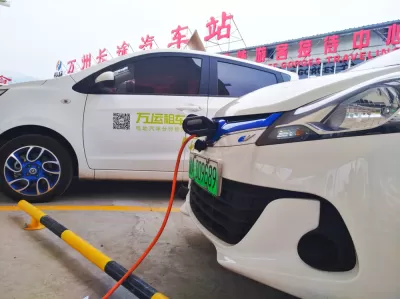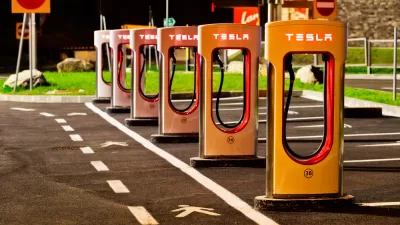Auto analyst John Voelcker discusses the electric vehicle market in the U.S. on NPR. Ominous clouds belie the excellent sales figures for last year, and policies pushed by Trump only ensure that motor vehicles will continue to gulp more gasoline.

Last year set a record for the rate of increase of electric vehicle (EV) sales that will be hard to beat: 81 percent higher than 2017, thanks to demand for the Tesla Model 3 and the Herculean effort by CEO Elon Musk to deliver on the tremendous volume of pre-sales. But without the Model 3, "U.S. EV sales increased by only 11 percent last year, a poor showing by most standards," reported Julia Pyper for Greentech Media.
It's within that context that John Voelcker, the first editor of Green Car Reports, discusses the current market for electric vehicles in the U.S. with Mary Louise Kelly, a co-host of NPR's All Things Considered (audio available).
Kelly asks, "Are carmakers making any money off electric cars yet?"
I don't think battery electric cars are profitable for any carmaker in the world right now... The problem is that manufacturers don't necessarily want to make electric cars, Tesla excepted. But starting in 2012, California really forced them to.
In other words, with few exceptions, e.g., the Nissan Leaf, the sad reality is that most electric vehicles on the U.S. market today are "compliance cars": by definition, unprofitable.
If it weren't for the California Air Resources Board's Zero-Emission Vehicle (ZEV) Program that requires the top auto manufacturers to sell ZEVs (including fuel cell electric vehicles as well as EVs) or purchase ZEV credits in order to sell their internal combustion engine vehicles, there would be far fewer EV models available in California and the nine other "Section 177" states (listed here by the Center for Climate and Energy Solutions) and now Colorado that have adopted the ZEV program.
International EV market more competitive
CleanTechnica's Maarten Vinkhuyzen explains why EVs in Europe are not compliance cars, rather, they are competitive and profitable despite most European nations offering less generous financial incentives than found in the U.S.
But the really "important driver for electric cars is China," Voelcker tells NPR's Kelly.
U.S. carmakers understand that in order to be competitive in China in future years, they're going to have to sell a huge volumes of electric cars. People drive lower distances there. And there are enough first-time buyers, and people are more open to innovative kinds of cars in China that electric cars, in some ways, aren't as hard to sell.
Ominous closing to a positive NPR report
Voelcker ends his discussion with Kelly on a rather ominous note that makes this correspondent question the title of the piece, "The Increasing Demand For Electric Cars," considering the audience are Americans, not Europeans or Asians.
In the States, we drive a long way. We don't have functional mass transit in most of the country which a place like Europe does, so you may not need quite as long a range in an electric car. And electric cars have been enormously politicized.
All of that has led some auto industry analysts to wonder whether the U.S. becomes - you could call it an island, or one analyst called it a backwater where the rest of the world embarks on this transition more aggressively and the U.S. does not.
Fuel efficiency standards rollback will reduce the already low demand for EVs in the U.S.
A two-year-old post described the diminished outlook for EV sales should the Trump administration be successful at reducing fuel efficiency standards, as the EPA/USDOT proposed on August 2.
If the Trump administration is successful in withdrawing the waiver that allows California and like-minded states to set stricter standards, compliance cars would no longer be needed, meaning even fewer EV models would be available for U.S. customers.
Higher gas prices would help
There is one thing that the Trump administration and Congress might agree to do that would unintentionally stimulate EV sales, but politically, it's a huge challenge. As noted in a Febuary 2018 post, "Trump's 25-Cent Infrastructure Tax?," a 25-cents per gallon gas tax would add "around 1.2 million additional EVs on the road by 2050," according to an analysis [pdf] by San Francisco-based Energy Innovation.
During a March 6 hearing before the U.S. House of Representatives Ways and Means committee on "Our Nation’s Crumbling Infrastructure and the Need for Immediate Action," American Trucking Associations President Chris Spear "proposed that Congress adopt a 20-cents-per-gallon fee on motor fuels," reported Eugene Mulero for Transport Topics. Joining him at the hearing were the U.S. Chamber of Commerce, the AFL-CIO and the American Society of Civil Engineers, all in support of hiking federal fuel taxes to keep the Highway Trust Fund solvent.
Related in Planetizen:
-
Banner Year for Electric Vehicle Sales, January 16, 2019
-
China Will Drive Electric Vehicle Market, June 4, 2018
-
Climate Challenge: Not Enough EVs or Too Many SUVs? March 5, 2018
-
Where's the Interest in Electric Vehicles? February 17, 2018
-
The Era of the Electric Vehicle is Approaching, July 17, 2017
FULL STORY: The Increasing Demand For Electric Cars

Study: Maui’s Plan to Convert Vacation Rentals to Long-Term Housing Could Cause Nearly $1 Billion Economic Loss
The plan would reduce visitor accommodation by 25,% resulting in 1,900 jobs lost.

Alabama: Trump Terminates Settlements for Black Communities Harmed By Raw Sewage
Trump deemed the landmark civil rights agreement “illegal DEI and environmental justice policy.”

Why Should We Subsidize Public Transportation?
Many public transit agencies face financial stress due to rising costs, declining fare revenue, and declining subsidies. Transit advocates must provide a strong business case for increasing public transit funding.

Paris Bike Boom Leads to Steep Drop in Air Pollution
The French city’s air quality has improved dramatically in the past 20 years, coinciding with a growth in cycling.

Why Housing Costs More to Build in California Than in Texas
Hard costs like labor and materials combined with ‘soft’ costs such as permitting make building in the San Francisco Bay Area almost three times as costly as in Texas cities.

San Diego County Sees a Rise in Urban Coyotes
San Diego County experiences a rise in urban coyotes, as sightings become prevalent throughout its urban neighbourhoods and surrounding areas.
Urban Design for Planners 1: Software Tools
This six-course series explores essential urban design concepts using open source software and equips planners with the tools they need to participate fully in the urban design process.
Planning for Universal Design
Learn the tools for implementing Universal Design in planning regulations.
Smith Gee Studio
Alamo Area Metropolitan Planning Organization
City of Santa Clarita
Institute for Housing and Urban Development Studies (IHS)
City of Grandview
Harvard GSD Executive Education
Toledo-Lucas County Plan Commissions
Salt Lake City
NYU Wagner Graduate School of Public Service



























